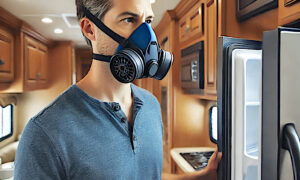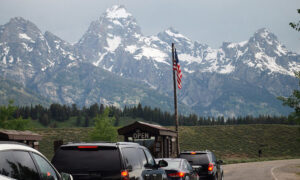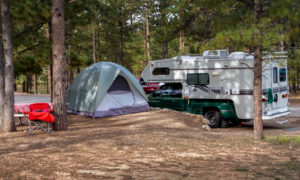
One question frequently asked by new RVers is should the RV water heater be left on or only turned on when you need hot water.
There is no right or wrong answer so I’ll try offer some information that hopefully will make it easy for you to decide what will work best for you.
As full time RVers, Fran and I consider our RV our home and we treat it as such. Just as people who’s home is a conventional house leave their water heater to operate unattended so do we.
For us, it’s a real pain to discover, just when you’re ready to take a shower, that we forgot to switch on the water heater. It happens more often than not when we have tried to conserve electricity/propane by ‘temporary’ use of the water heater.
Our water heater can operate either on propane, electric or both. We usually just let the electric element heat the water since it does a good job and doesn’t use up our propane. During the summer though, when we’re running the air conditioner along with all the computers, TVs and microwave oven, ice maker etc., the addition of the water heater electric element is enough to trip the 30amp circuit breaker. So, sometimes it’s necessary for us to switch off the electric heater and switch on the propane. It’s easy enough, the two switches are handy.
When we need to heat water fast we will switch on both the electric and propane.
Now some RVers will only switch on the the RV water heater just before they need it. If you’re organized enough to know ahead of time you’ll need hot water that’s perfectly okay. The water heater tank is fairly well insulated and the water can stay warm for several hours depending on how cold it is outside. Warm water is all you really need to wash your hands or an occasional dish or two. But once you need to wash a lot of dishes or take a shower you’ll have to wait until the water is heated.
One RVer wrote that a person in the family used oxygen so they were concerned about the propane flame on the heater. They never used the heater unless the person was out of the RV. This is an unfounded fear.
The flame of the water heater, and the furnace for that matter, is vented to the outside of the RV and well isolated from the interior. This is why you can use the heater without fear of carbon monoxide poisoning.
Some RVers complain the water heater is too noisy. This can be a legitimate complaint if the water heater is on the curb side and you are sitting outside next to it. But normally, if the burner sounds like a blast furnace you should have the burner adjusted. A properly adjusted burner shouldn’t be that noisy.
Lastly, some RVers simply believe they are conserving propane/electricity by only heating water when needed. Others argue the energy used to get the water up to temperature each time you turn on the heater is greater than what is used to just keep it hot. I believe the later but, to my knowledge, there has not been a scientific study to prove which camp is right so you’ll just have to decide that question for yourself.
———
Looking for great RV tips and Information?
Get one or more of the well written and informative ebooks below.
- Insiders Guide to Buying an RV
- RV Care and Maintenance
- Dinghy Towing
- 101 Tips for RVers
- Pop-Up Basics 101
- Checklists for RVers
- Complete Guide To: RV Towing, Weights, Hitch Work & Backing
- RV Awning Use, Care and Accessories
- Deep Cycle Battery Care and Maintenance
- RV Buyers Survival Guide
- RV Campground Basics
- The Three Primary Systems of an RV:
LP Gas, Fresh Water & Electrical
Get more Information and Purchase







I worked in the wholesale electric industry for the US Dept of Energy marketing hydroelectric power and energy and involved in energy conservation matters.
The electric utilities used to advise customers to keep their electric hot water heaters and air conditioners alone during the day claiming it cost more to get them up to speed when needed. However, I understand that is wrong, instead, thermostats should be lowered/raised when the heating/cooling units are not needed such as leaving for work during the day. The units consume more energy if left at their normal settings.
An air conditioner unit consumes a greater amount of energy when first starting but that energy is effectively recovered through time by running the unit at a higher temperature setting when not in use.